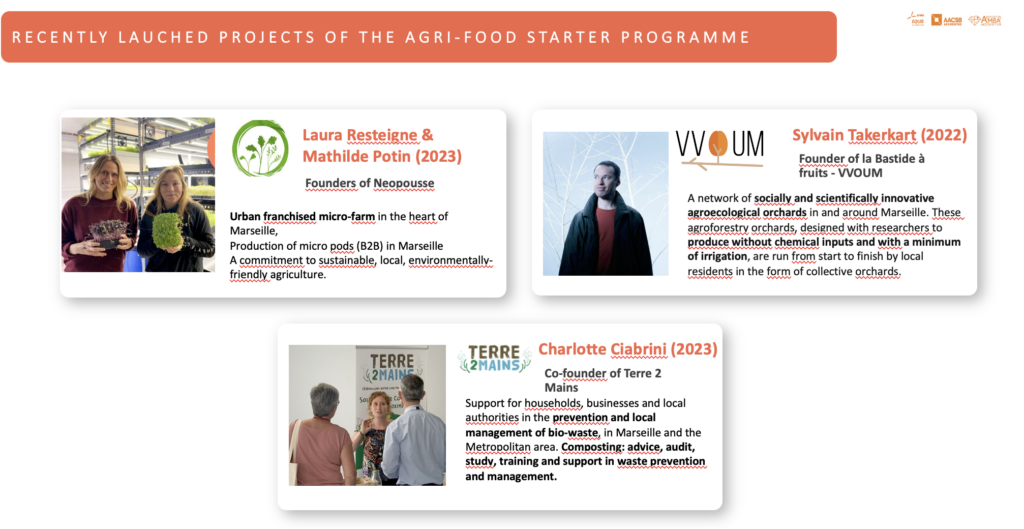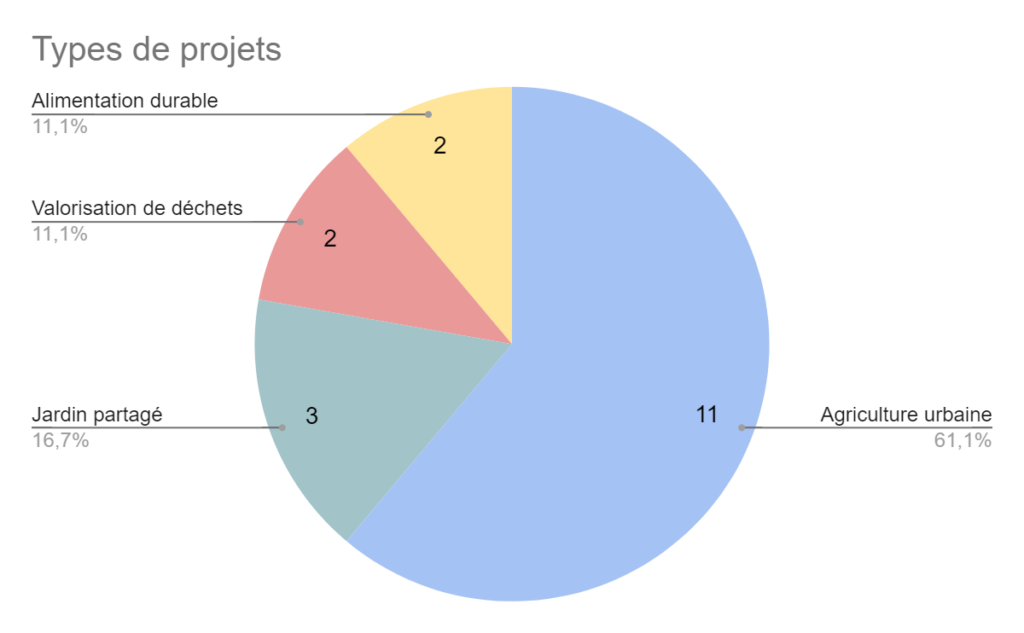Since 2021, the Cité de l’agriculture, in partnership with Inter Made has been offering a sector-based theming of the “Starter” pre-incubation pathway. The nourishing specialisation (sustainable agriculture and food) is aimed at agricultural production and sustainable food projects: micro-farms, nourishing third places, crafts, agri-food VSEs.
| The programme in figures | |
| – 7 sessions organised – financed by the Region for three years (2022-2024) – budget €234K – 27 project leaders supported | – 3-month intensive course – 6 days of training, – 4 to 6 one-to-one cross-support meetings – 1 mentor/project (a manager from an organisation in the same sector) |
The project leaders supported have had from 3 years to less than 1 year to pursue the process of making their project a reality. Now that the funding period has come to an end, and with the benefit of hindsight provided by several promotions, it is appropriate to study their trajectories to reflect on the strategic direction of the support and training on offer. One of the avenues being considered is to develop a long-term offer (3 years), coupled with Inter-Made’s incubator activity.
The Cité de l’agriculture therefore carried out a study on the future of entrepreneurs and their projects, which enabled us to assess the extent to which they had been implemented, to identify the characteristics of the projects that had been set up and the reasons that had prevented them from being set up or launched, and to gain a better understanding of the pathways followed and the difficulties encountered after the support had been provided.
The 27 project leaders were contacted and 19 responded, giving a response rate of 70%. The sample is therefore fairly representative, especially as there is a good spread of respondents across the different years, with always half or more of the participants responding.
An online qualitative questionnaire was drawn up to gather feedback from project leaders, either independently (3) or during a telephone interview in which their answers were entered (16). The questionnaire consists of 50 questions grouped into 5 themes: project typology, project implementation, project holders’ career paths, difficulties encountered and the support they received from the Cité de l’agriculture.
Main findings
| The findings of this study confirm the relevance of the approach envisaged by the Cité de l’agriculture for the development of its support services: extending the length of the support period would encourage projects to come to fruition. The idea of associating the Cité de l’agriculture with the Inter-Made incubator seems to be a relevant strategic direction. |
→ The decision to specialise the programme’s training with specific modules run by the Cité de l’agriculture, focusing on sustainable agriculture and food, has resulted in a higher project completion rate (+10 points) than that normally seen in non-specific programmes, and a drop-out rate divided by 2.
→ Through its role as a network leader, the Cité de l’agriculture is integrated into the fabric of local operational and political players. It brings this asset to individual support, and links with these players are recognised and considered relevant, even essential, for some project leaders who have been able to find suppliers or land thanks to these contacts.
→ Individual support is valued by the project leaders, who see it as a special time to anchor their project, but they also emphasise the major role played by the group in their progress, particularly the exchanges with other participants in the same session.
→ The main difficulties encountered by project leaders after the Nurturing Specialisation: difficulty in finding a financial balance/model, difficulty in accessing land, lack of certain technical skills and knowledge, multiplicity of players with whom to interact and sometimes loneliness in projects run individually, could be reduced by extending the support time. This would allow individual meetings to be spread out over a longer period of time, more opportunities to take part in network events, to meet relevant contacts (suppliers, elected representatives, funders, etc.), and to go into greater depth on subjects that have already been discussed in training sessions, etc.
→ Some project leaders also stress that they experience the interruption of support after 3 months as too early a break in the project.
→ In the years following their participation in the programme, all the project promoters felt the need for further training, but once they had left the support process, they could no longer afford it due to financial constraints.



Focus on results
- Projects completed by 31 January 2024
8 completed + 8 postponed + 3 abandoned = 19 respondent projects
| Types of projects | Making it happen |
| 4 types : – urban agriculture, – shared garden, – waste recycling – sustainable food + More than ½ are urban agriculture projects | – 8 projects completed – Only 3 of the 11 unfinished projects were abandoned, the others were postponed. – 5 of the 8 rejected are urban agriculture projects |
| Making generalist career paths a reality: – 35% completion – 30% abandonment – 35% rejected | Realisation Nurturing specialisation : – 42% completion (+7 pt) – 16% drop-out (-14 pt) – 42% rejected (+7 pt) |
Of the 8 projects that were postponed, 5 were urban agriculture projects, for which one of the main obstacles to implementation was the acquisition of land, a process that is notoriously long and difficult. The success rate for the Food Specialism is higher than for the generalist courses offered to project leaders (+7pt). The drop-out rate has been halved, suggesting a beneficial effect of the specialisation.

Although the study provides a snapshot of the number of projects completed in February 2024, the figures presented are likely to change, with a higher rate of completion.
12 of the 19 respondents had no previous experience of urban agriculture or sustainable food. This calls into question the relevance of just 3 months’ training as a basis for launching a project.
- Analysis of barriers and levers
Projects completed and not completed share 3 main difficulties encountered:
- Financial difficulties
“We didn’t have an economic model within the association, and we didn’t manage to pull the right strings to obtain subsidies” – Valentin
“I’m having trouble finding other outlets, I’ll need time and training” – Audrey
At least two project leaders had to.Atproject leaders have had to postpone their project because their ARE (Allocation chômage d’aide au retour à l’emploi) entitlements have come to an endand they are unable to continue to invest full-time in setting up their project. - Lack of experience and technical knowledge
“I lacked technical knowledge, I needed more farming skills and experience” – Margaux
“I clearly lack expertise as an entrepreneur” – Guillaume
“The module on standards was very generic, there was no visit, I realised I didn’t have enough knowledge about regulations” – Cécile - Difficulties accessing land/agreements and insecure leases
“My lease is not stable. What’s more, I’ve already moved house several times, and it’s only been a year since I considered myself to be ‘well settled'”.Audrey
“With our agreement, you can be thrown out from one day to the next.”Bertrand
“It’s very difficult to find a big enough space in town” – Fabrice
Financial difficulties were directly linked to a lack of skills and training by several project leaders.
For projects that have come to fruition, the 3 common difficulties are compounded by the fact of being alone.
The people around my project are involved from time to time, but not on a long-term basis, and I can’t manage to get them involved either because of a lack of time” – Valentin
“It’s really difficult to invent a structure on your own from A to Z” – Bertrand
For projects that have not materialised, the fourth difficulty identified is interaction with a large number of stakeholders.
Interacting with the social landlords was very difficult” – Fabrice
“It’s always difficult to find the right person to talk to – the town hall, the region, the département… There’s always someone to talk to on each subject, and it’s complex” – Mathieu
- Benefits and limitations of the Specialised Nourishment programme
The project promoters highlighted the relevant contributions of the feeder programme. Firstly, interesting and relevant educational content for training in project set-up. Although financial difficulties were highlighted as a hindrance, many stressed the value of the feeder programme in their financial set-up, reflection on the legal status chosen, etc. For at least 9 project leaders, the input on these issues was decisive.
Another of the most important contributions emphasised by the respondents was the networking with local economic players, and also between project leaders. In fact, the emulation of their meetings was very beneficial for some of them, as at least 6 project leaders emphasised in the interviews. One project owner described how the individual support and networking enabled her to meet suppliers and financiers.
“What stood out for me was the fact that I got to meet the market gardeners in the field.It clarified a lot of things for me on the technical side, which I didn’t know anything about” – Mathieu
“The course put me in touch with everyone involved in urban agriculture” – Margaux
“It enabled me to develop my network, I met people with whom I’m still in contact” – Valentin
“It was very motivating to be all in the same boat” – Thaïs
Nevertheless, several project leaders regretted the high volume of information transmitted in a short space of time, and the fact that the monitoring stopped after three months.
I would have liked to have seen a continuation of the Cité’s follow-up after the Starter course” – Mathieu
“A lot of information in a very short space of time, with points that deserved more attention.Sometimes I had the feeling that my head was full of information at the end of the day” – Thaïs
“Some of the modules offered were too short, the training was too intense overall and I think it would be beneficial to add a few more days of training.” – Justine.
